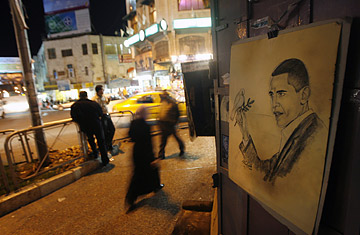
Palestinians walk past a drawing of U.S. President-elect Barack Obama in the West Bank city of Ramallah
(2 of 4)
Iran: Twilight of the Demagogue?
Not yet in the Oval Office, President-elect Obama is already facing strong
pressure from both sides of the aisle to treat Iran's nuclear program as an
urgent crisis and to escalate diplomatic pressure on Tehran to suspend its
uranium-enrichment activities. On the campaign trail Obama both
advocated direct talks with Iran and vowed that Tehran would not be allowed
to attain a nuclear weapon. Iran is not close to constructing a nuclear
weapon, according to U.S. intelligence assessments, but the standoff right
now is over whether Iran should be allowed to enrich uranium on its own soil
— a right it would typically enjoy under the Non-Proliferation Treaty for
peaceful nuclear energy purposes, but which would also give it the means to
produce nuclear weapons fuel.
Iranians across the political spectrum have supported their government's hard-line rejection of any attempt to deny their "nuclear rights," but concern has grown in Iran's political establishment over the provocative stances taken by President Mahmoud Ahmadinejad, whose grandstanding, they warn, has weakened Iran's position and raised the danger of confrontation. However, Ahmadinejad faces a tough re-election battle in June, and there have been questions over whether his health will allow him to run for a second term. If he does, he's likely to face a close fight from a united front of pragmatic conservatives, like current parliamentary speaker and former nuclear negotiator Ali Larijani and former President Ali Akbar Hashemi Rafsanjani, and reformists like former President Mohammed Khatami. And just as it was the economy that got Ahmadinejad elected in 2005 on a populist chicken-in-every-pot platform, so could the failing economy prove his undoing. Many of Iran's glaring economic deficiencies (including inflation, youth unemployment and, ironically, fuel scarcity) were cushioned during Ahmadinejad's tenure by soaring petroleum prices. Falling world oil prices will spur a crisis in Iran that will make international sanctions more painful.
Ahmadinejad clearly would have preferred a McCain victory, so that he could have used the Senator's "bomb Iran" jokes and tough rhetoric to talk up the idea of an imminent U.S. threat, urging the electorate to back him as an act of defiance. Even if Obama's victory represents more of a change in style than the substance of its policy, the confluence of economic bad times and the possibility of an improved, respectful relationship with the U.S. based on dialogue — and the prospect of U.S. withdrawal from Iraq — sets the scene for an Ahmadinejad defeat. Of course, Iran's President does not make national-security decisions; that's the prerogative of the Supreme Leader, Ayatullah Ali Khamenei. But a change in presidential style in Tehran paralleling the stylistic change in Washington may combine to reduce the risk of escalation and confrontation.
